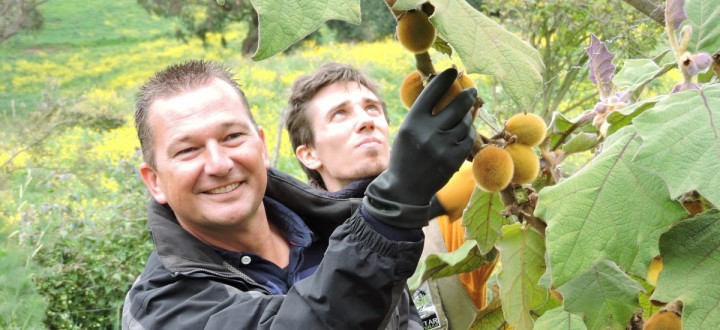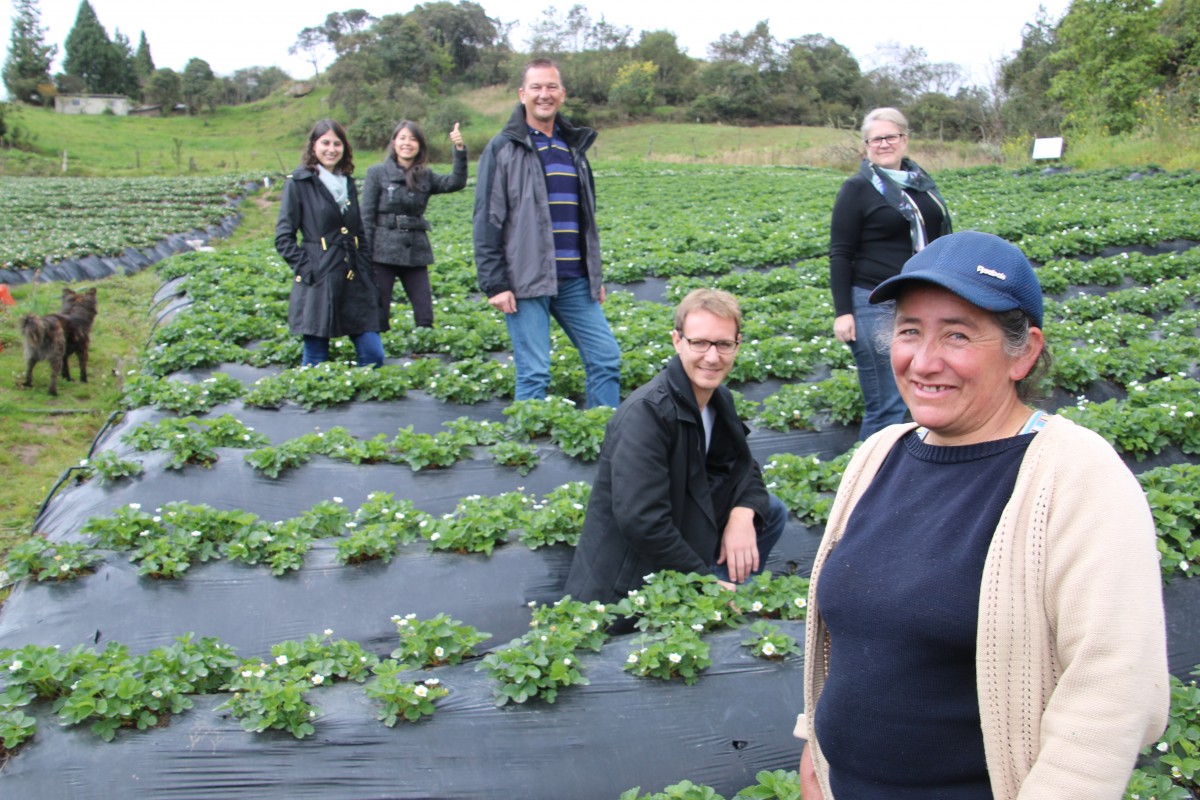“Go with the flow.”
It’s hard to actually understand what it means until you find yourself in a foreign country surrounded by people you hardly know trying to solve a difficult problem.
This fall, I had the opportunity to participate in the SAP Social Sabbatical, a CSR initiative that sends teams of 12 employees from different countries to eight emerging markets around the world to work with local non-profits and social enterprises to help them better operate.
The first question I was asked when I was selected to participate in a Social Sabbatical in Bogotá, Colombia was “So, Rainer, are you going to grow vegetables?” Although meant as a joke, it also reflected some of the stereotypes that many people have in their minds when thinking about Colombia.
Before my arrival, I was assigned to provide business development support to a project called Seeds of Confidence, along with my colleagues Fiona Smith from Australia and Pierre Combe from France. Part of the non-profit organization “Proyectar sin Fronteras” (PSF) in Bogotá, Colombia, Seeds of Confidence actually does grow vegetables! In fact, their mission is to bring people together to grow, sell, and finally consume healthy organic produce. This is a big task; in vulnerable areas of Bogotá, over 38 percent of the population suffers from food insecurity, 30 percent live in extreme poverty and the rate of unemployment is high—11.3 percent are unemployed and 25 percent have only informal employment. Furthermore, there’s a general low level of vegetable consumption (lowest in the region) and an inappropriate use of public and private spaces. Seeds of Confidence addresses many of these problems through three methods of impact:
- Helping young children, students, and families to learn for life by educating them on organic agriculture in kindergartens and schools
- Helping society to learn how to grow organic food in the community by educating people on the usage of green houses and other installations which can be used anywhere, for example on roof tops. This helps communities to support each other for a better society
- Helping families to live a healthier life by delivering organically produced fruit, vegetables, and other fresh products to their doors every week in baskets
The SAP Social Sabbatical team educates young children, students, and families about organic agriculture.
Besides the end-consumers, Seeds of Confidence spends a lot of time improving producer supply chains, primarily focused on the production of food to fill the baskets that are sold to the community. They help producers to start their business by educating them on organic agriculture. Our team had to figure out how to help grow their businesses by finding more sales opportunities within the community in Bogotá, and ultimately, how to scale their business model into Peru and Brazil
I learned three critical lessons as a result of this experience.
The Right Team Makes Anything Possible
I remember the moment after our team’s first presentation to our customer, which took place on our second day. The immediate reaction was “Wow, you really know what you are doing. How long have you been working together?”
Our team, which had never met prior to our arrival four days earlier in Bogotá, was surprised by the compliment, but it helped us to learn a very important lesson: with the right people on a team, anything is possible. With the right attitude, passion, and motivation, we worked together on our joint mission to help achieve the common goal. Over the course of the project, we realized that three key themes helped our continued success: professionalism, personal trust, and fun.
The First Requirement for Success is Listening with an Open Mind
Before we went on the journey, we had several preparation calls with the group. One key lesson was to “listen first,” which we immediately translated into “just shut up and listen.” While this is very easy in theory, in reality, it poses a much greater challenge than one initially anticipates. Smart business people often have a tendency—even urgency—to immediately come up with ideas and solutions, without necessarily having a clear understanding of the problem. Once I think I know, I typically don’t want to spend the time to validate that my assumptions are correct.
Very early in our project, our team tried to be disciplined about validating assumptions when we interviewed the Seeds of Confidence team. We wrote down all facts or visualized our conclusions with our interview partner, on paper, flipcharts, or whiteboards, whatever was available. It took us countless hours to verify what we had understood about their producers, customers, cost and revenue structure, processes, communication assets, etc. But visualization and asking the same questions again and again helped us avoid misunderstandings and get the truth more effectively.
An Effective Team Requires a Clear Mission
Fiona, Pierre, and I had a debrief session every day in which we shared our personal observations, anecdotes, learnings, as well as different aspects of our project planning and optimization. One of the main challenges we continued to encounter was time management. Each of us was accustomed to professional time management—meetings starting and ending on schedule—but this simply is not the way most people operate in Colombia. On average, it takes 30 to 45 minutes to get a taxi, traffic is completely unpredictable—our commute took between 10 and 90 minutes during the same time on different days—and meetings are often moved, sometimes even more than once. Of course, there are exceptions, but variable time management makes it difficult to manage expectations and deadlines. This reality motivated our slogan “go with the flow,” which actually released some of the pressure we felt because we could not meet our own schedule. We had to adapt to local behavior—and it worked!
The team provided their client with skills-based insights and consultation while building their individual leadership skills.
The one thing we never changed was our joint mission. To us it was crystal clear that we have to deliver specific value within the given time-frame. We even adapted the original scope of work for the project to adjust to the daily business needs of the customer. Instead of reviewing the business plan, we focused on operational practices and how to optimize it. This included a specific 30-60-90 day plan for the manager and the team on what to do and how to do it. Even more important, we talked to each individual and trained them on these actions. The direct interaction with people was key to success. When we finally presented all the details and also the strategy to grow the business over the next two years, the feedback from Juan Forero, the Vice President of Seeds of Confidence, was clear: mission accomplished. Our team could not have been more pleased with the results.
When I returned from Bogotá, I asked myself many times how best to transfer the experience I gained in Colombia into my normal business life at SAP. The first three weeks back home were difficult, but I quickly came to realize how much the experience had changed my perspective and my communication style.
First, my SAP experience dramatically changed how I communicated with people I work with on a regular basis. Almost every Colombian I met was genuinely interested in how I liked their country and how Colombia is perceived by Germans. Even when we could not really speak in one common language, we always found a way to communicate on certain topics. (One of their favorites was about German soccer, since Germany beat Brazil in the World Cup after Brazil knocked out the Colombian team).
I realized the value in having a personal interest in everyone I work with, and I try to make a habit now in business meetings to ask at least one or two questions that reflect my true interest in the other person. This requires thinking in advance and being more explicit on my expectations, but this personal approach can have a game changing effect when it comes to getting people on board. Even in private life I have experienced that showing more real interest and asking more questions helps to establish a more personal and impactful conversation. It is amazing what you can learn from people if you simply ask.
When we visited farmers in rural areas outside Bogotá, we witnessed the realities of some of the least fortunate people with very limited incomes. But instead of just looking and observing (what I have done in some of my vacations), we also had long conversations with them. Suddenly, I could understand that these weren’t people simply living in a stereotype of poverty, but people who are proud of their work and who enjoy life a great deal, despite their financial limitations. These were very emotional moments and more than once I thought “If we think we have problems, we should think again!” Almost every day in business, I hear about the next big “real problem.” It helps to pause for a moment and put things into perspective. In some of my team meetings, I simply give everyone time to reflect and to share these personal views with the group. It is amazing how this exercise helps change perspectives. Little moments of reflection and appreciation can make a big difference.
Cross-border, global pro bono experiences like the Social Sabbatical are inherently personal, requiring each person to step outside their personal comfort zone. Only when I have experienced difficult environments, surprising behaviors, or completely unexpected challenges can I realize how I actually cope with them. If everyone could experience the value of the Social Sabbatical, maybe we could all help the world better operate.
Rainer Stern
Rainer Stern is a 45 year old sales professional who has been working for SAP for almost 20 years. In his current role he is responsible for Global Sales Leadership Programs to enable the sales force and leaders of SAP across all regions and countries. In the past, he has spent several years in the USA, Australia/New Zealand and across Asia Pacific in his mission to make Sales more successful. His experience as a Global Account Director for SIEMENS helps him to design and run programs on a global level. In October 2014, he spent 4 weeks on the SAP Social Sabbatical in Bogotá, Colombia.







Pingback: CSR World Congress & [email protected] Reinforce Sustainable Business for Fostering Social Change - New Global Citizen
Pingback: Fundamental Realities in the Fight to End Hunger by 2030 - New Global Citizen